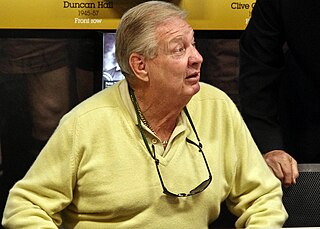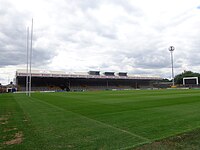The Ashes series, similar to the cricket series of the same name, was a best-of-three series of test matches between Australia and Great Britain national rugby league football teams. It had been contested 39 times from 1908 until 2003 largely with hosting rights alternating between the two countries. Since 1973, Australia has won a record thirteen consecutive Ashes series.

The Great Britain national rugby league team represents Great Britain in rugby league. Administered by the Rugby Football League (RFL), the team is nicknamed The Lions.

The Australian national rugby league team, the Kangaroos, have represented Australia in senior men's rugby league football competitions since the establishment of the game in Australia in 1908. Administered by the Australian Rugby League Commission, the Kangaroos are ranked first in the IRL Men's World Rankings. The team is the most successful in Rugby League World Cup history, having won the competition 12 times, and contested 15 of the 16 finals, only failing to reach the final in the 1954 inaugural tournament. Only five nations have beaten Australia in test matches, and Australia has an overall win percentage of 69%.
William John Smith is an Australian former rugby league footballer. He was the leading halfback in Australian rugby league during the late 1960s, and a keystone of the latter part of the St. George Dragons' eleven consecutive premiership victories between 1956 and 1966. He represented Australia in eighteen Tests and eight World Cup games between 1964 and 1970. He captained Australia in a World Cup game against Great Britain in 1970.
Barry Muir was an Australian professional rugby league footballer and coach. An Australian and Queensland representative halfback, he played in 22 Tests between 1959 and 1964, as captain on two occasions.
Kenneth John Irvine, also nicknamed "Mongo", was an Australian professional rugby league footballer who played in the 1950s, 1960s and 1970s. He holds the standing Australian record for the most tries in a first-grade career – 212. No other player has yet managed 200 tries in their Australian club career, with the closest to Irvine's tally being South Sydney Rabbitohs player Alex Johnston who has scored 195 tries. He is also the 2nd all-time top try-scorer for the Australian national team with 33, two behind Darren Lockyer's 35. Irvine's great speed is legendary and he is regarded as Australia's greatest ever winger, being named in 2008 in the list of Australian rugby league's 100 greatest players, as well as being an automatic selection for the Australian Rugby League's "Team of the Century".

Robert James McCarthy MBE is an Australian former professional rugby league footballer and coach. He played for the South Sydney Rabbitohs, Canterbury-Bankstown Bulldogs, New South Wales and for the Australian national side. He later coached in Brisbane, taking Souths Magpies to a premiership in 1981 and coaching the Gold Coast-Tweed Giants upon their entry to the Winfield Cup. Since 2001 he has been the chairman of both the Australian and NSW state selection panels.

Station Road was a stadium in Pendlebury, near Manchester, England. It was the home of Swinton Rugby League Club between 1929 and 1992 and was widely recognised as one of the finest grounds in the Rugby League.
Johnny Cecil King is an Australian former rugby league footballer and coach. He was a winger with the St. George Dragons for the last seven years of their eleven consecutive premiership-winning run from 1956 to 1966. He was a representative in the Australian national team from 1966 to 1970, earning 15 Test caps. He has been named among the nation's finest footballers of the 20th century.

Graeme Frank Langlands, MBE,, also known by the nickname of "Changa", was an Australian professional rugby league footballer who played from the 1950s till the 1970s and coached in the 1970s.

Arthur James Summons was an Australian representative rugby union and rugby league player, a dual-code rugby international fly-half or five-eighth. He captained the Australian national rugby league team in five undefeated test matches from 1962 until 1964 and later also coached the side.
Frank Stanton, also known by the nickname of "Biscuits", is an Australian former professional rugby league footballer who played in the 1960s, and was a successful club and national representative coach in the 1970s and 1980s. He was educated at North Sydney Boys High School. Both his playing and his club coaching careers were with the Manly Warringah Sea Eagles, although he later also went on to coach the Balmain Tigers and North Sydney Bears. He enjoyed success as coach of the Australian national side from 1978 to 1984, being at the helm in the period when the Kangaroos began to consistently dominate the other rugby league playing nations. Since the death of Norm Provan on 13 October 2021, Stanton is both the oldest and earliest winning of all the living premiership winning coaches.
Eric Clay was a British rugby league referee popularly known as "Sergeant Major" for his style during games.
Ken Maddison is an Australian former rugby league footballer who played in the 1960s and 1970s. He played in the New South Wales Rugby Football League premiership for the St. George Dragons and later the Cronulla-Sutherland Sharks. He was also a state and national representative, playing four Tests for Australia in 1973.
The 1973 Kangaroo Tour was the thirteenth Kangaroo Tour, and saw the Australian national rugby league team travel to Europe and play nineteen matches against British and French club and representative rugby league teams, in addition to three Test matches against Great Britain and two Tests against the French. It followed the tour of 1967-68 and the next was staged in 1978.
The 1967–68 Kangaroo tour of Great Britain and France was the twelfth Kangaroo Tour, and saw the Australian national rugby league team travel to Europe and play twenty-one matches against British and French club and representative rugby league teams, in addition to three Test matches against Great Britain and three Tests against the French. It followed the tour of 1963-64 and the next was staged in 1973.
The 1959–60 Kangaroo tour was the tenth Kangaroo tour, in which the Australian national rugby league team traveled to Europe and played thirty-seven matches against British, French and Italian teams, including the Ashes series of three Test matches against Great Britain, two Test matches against the French and an additional two non-Test matches against an Italian representative team. It followed the tour of 1956-57 and the next was staged in 1963-64.
The 1961 Kangaroo Tour of New Zealand was a mid-season tour of New Zealand by the Australia national rugby league team. The Australians played nine matches on tour, including two tests against the New Zealand national rugby league team. The tour began on 17 June and finished on 10 July.
The 1956–57 Kangaroo tour was the ninth Kangaroo tour, in which the Australian national rugby league team travelled to Great Britain and France and played twenty-eight matches, including the Ashes series of three Test matches against Great Britain and three Test matches against the French. It followed the tour of 1952–53 and the next was staged in 1959–60.
The 1952–53 Kangaroo tour was the eighth Kangaroo tour, in which the Australian national rugby league team travelled to Great Britain and France and played forty matches, including the Ashes series of three Test matches against Great Britain and three Test matches against the French. It followed the tour of 1948-49 and the next was staged in 1956-57.








